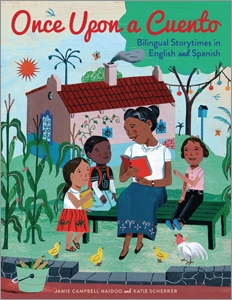Primary tabs
You don't need to be an ALA Member to purchase from the ALA Store, but you'll be asked to create an online account/profile during the checkout to proceed. This Web Account is for both Members and non-Members.
If you are Tax-Exempt, please verify that your account is currently set up as exempt before placing your order, as our new fulfillment center will need current documentation. Learn how to verify here.
- Description
- Table of Contents
- About the authors
- Reviews
It is imperative that library programs reflect the rich diversity of the entire community. That includes Spanish-speaking children, who need opportunities to hear their home and school languages spoken, and to see their lives validated through engaging cuentos (stories) that reflect their cultural experiences. Additionally, when combined with other forms of targeted outreach, offering bilingual storytimes in English and Spanish is an effective strategy to attract Latino and Spanish-speaking families to your library. This all-in-one resource, written by two experienced specialists who understand the nuances of library services, collections, and outreach to this population, shows you how. Suitable for libraries just getting started as well as those with programs already in place, this guide
- discusses the importance of bilingual programming in the lives of Latino and Spanish-speaking children, addressing the unique educational and informational needs of bilingual children;
- provides 18 ready-to-use program plans for bilingual storytimes, suitable even for storytime leaders who don't speak Spanish;
- includes several templates for designing bilingual storytimes, arranged by specific age groups;
- recommends numerous children's books, songs, and professional resources to assist librarians as they plan their bilingual programs;
- explores the opportunity for digital media usage in storytimes for Latino and Spanish-speaking families, with examples of apps that can help meet the multiple literacy needs of bilingual children; and
- suggests ways to perform outreach to Spanish-speaking and Latino communities, emphasizing the importance of relationship-building and community collaboration.
Enhanced with interviews and advice from experts affiliated with REFORMA (The National Association to Promote Library and Information Services to Latinos and the Spanish-Speaking), this book will become a trusted resource for children's librarians, school library media specialists, outreach and programming librarians, ESL educators, teachers, and professionals in child-care agencies.
Acknowledgments
Introduction
Part I Getting Started
Chapter 1 Bilingual Programming for Latino and Spanish-Speaking Children
Chapter 2 Beginning Outreach to Latino and Spanish-Speaking Communities
Chapter 3 Bilingual Storytime When You Do Not Speak Spanish
Chapter 4 Bilingual Storytime: One Program, Many Ways
Chapter 5 Using Digital Media in Bilingual Storytimes
Part II Resource Materials
Chapter 6 Ready-to-Use Bilingual Program Plans
Chapter 7 Recommended Professional Resources and Children's Media for Bilingual Programming
About the Contributors
Index
Jamie Campbell Naidoo
Jamie Campbell Naidoo, PhD, is an endowed associate professor at the University of Alabama School of Library and Information Studies. A former elementary school librarian and children's librarian, he teaches and researches in the areas of library services and programs to diverse populations. Dr. Naidoo has published numerous works on Latino children's literature and librarianship, including the book Celebrating Cuentos: Promoting Latino Children's Literature and Literacy in Classrooms and Libraries (Libraries Unlimited, 2010). He is active in REFORMA (The National Association to Promote Library and Information Services to Latinos and the Spanish-Speaking) and ALSC (Association for Library Service to Children).
Katie Scherrer
Katie Scherrer spends her time in the library and the yoga worlds, and she loves it when the two come together! Formerly a children's librarian, she is known for her consulting and training work helping libraries and educational organizations improve services to Latino immigrant communities through outreach and bilingual programming. She is also a Registered Yoga Teacher (RYT). Since 2013, she has been teaching yoga to children in many settings, including libraries, yoga studios, and schools. Katie graduated summa cum laude from Capital University (Ohio) in 2004, traveled the world, fell in love with yoga and libraries, and received her Master of Library and Information Science (MLIS) degree from Kent State University in 2009. She is the coauthor of Once Upon a Cuento: Bilingual Storytimes in English and Spanish, published by ALA Editions. To learn more about Katie's work, or to schedule an online or in-person training session with her, please visit Connected Communites and Katie Scherrer Yoga.
"Offers a well-articulated rationale for bilingual programming and outreach ... Essential for both public and school librarians who serve the many diverse ELL populations living in the United States."
— School Library Journal
"[The authors] are aware of, and address, the limitations that many libraries have, like limited personnel, the lack of bilingual and bicultural librarians, and the low number of published books by Latino writers and illustrators. Nevertheless, this does not have to be an impediment, and the authors provide plenty of examples and resources of how to reach out and to provide bilingual storytimes as well as displays of the collection … This is a unique book, and I recommended Once Upon a Cuento to anyone interested in implementing bilingual storytimes in English and Spanish."
— Martín Blasco, WebJunction
"Libraries may be the first line of action to provide learning and enrichment in a child's native language as well as in English. Programming can seem difficult if a librarian does not know the language or the culturally relevant materials that are available. Not only are selection recommendations provided but sample templates; more than 60 pages of program plans; and extensive online, print, and multimedia resources are highlighted. The authors provide case studies in addition to tips and myths to help staffers know what to anticipate if they start bilingual storytimes."
— Booklist



